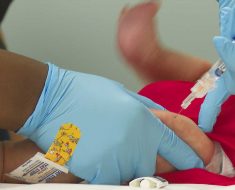Do you get cold sores on the regular? Or maybe you just aren’t convinced that the bump on the edge of your S.O.’s mouth is really a pimple? It’s about time you’ve brushed up on your cold-sore knowledge. Here are seven nasty facts you need to know.
They Are Herpes
Both cold sores and your typical “got that from sex” genital herpes are caused by the herpes simplex virus, says Susan Bard, M.D., a board-certified dermatologist with Vanguard Dermatology in New York City. There are two strains of the virus, HSV-1 and HSV-2. Generally, HSV-1 causes the on-the-mouth blisters, while HSV-2 causes issues below the belt.
They Can Spread to Your Partner’s Genitals – Or Even Your Eyes
That said, since the virus is transmitted through skin-to-skin contact, either strain can travel to pretty much any mucosal surface it touches. In fact, an increase in rates of oral sex (yay!) has actually led to an increase in the percentage of HSV-1 cases striking the genitals and HSV-2 cases on the mouth (boo!), says Bard. Also, if you touch your cold sore, then your eye, little blisters could spring up on your eyeball, she warns. Just thinking about that hurts. And sometimes, especially immediately following their initial infection, people shed the virus through their skin even if they don’t have a blister. There’s another reason to use protection during oral sex and wash your hands on the regular.
Almost Everyone Has HSV-1
There’s a nine out of 10 chance your kissing buddy has HSV-1, according to the University of Maryland Medical Center. And for that matter, there’s a nine out of 10 chance you have it, too. “Most individuals are infected in childhood, usually from sharing utensils with other infected family members or coming in close contact with others who are infected in situations like day care,” says Bard. “Infection is so common because infants often explore their environment by putting things in their mouths.”
They Are Plotting Their Return
Once you get the herpes virus, it never goes away. It just festers under your skin and waits for your immune system to get compromised or tied up with something else, says Rebecca Kazin, M.D., a board-certified dermatologist with the Washington Institute of Dermatologic Laser Surgery. Hence why your cold sores tend to pop up when you’re sick, stressed, or sunburnt. If you get cold sores more than six times a year, you should talk to your doctor about daily treatment options to prevent outbreaks, says Bard.
They Look Like Pimples – Only Grosser
Although rare, pimples can pop up on the edge of your lip. However, if you’ve got a little blister or pustule there, it’s most likely a cold sore, says Bard. Other clues: They easily rupture (expect blood and goo) and can often crust over and then hang out for several days before they fade away. If you still aren’t sure what that bump near your mouth is, ask your dermatologist to take a look at the lesion or test you for the virus, she says.
If You’re Infected, a Face Peel Could Cover Your Face in Cold Sores
Typically, before dermatologists perform any high-intensity laser treatments or peels on your face, they will either ask you if you’ve ever had cold sores—or will just prescribe you Valtrex (a common medication used to treat the virus) outright, says Kazin. That’s because, if you do have a herpes infection under your lips, resurfacing treatments can potentially allow the virus to come out and take control. “The infection can spread to your whole face,” she says. “It can be devastating.” If you have a history of cold sores, you may want to talk to your dermatologist before you even attempt waxing your lip.
They Can Harm Fetal Development
For pregnant women, the herpes simplex virus is more than a nuisance. Longstanding infections that have spread to the genitals can raise a woman’s risk of miscarriage, premature labor, low birth weights, and transmission to the baby during vaginal delivery. Meanwhile, as far as lip sores go, the biggest concern is preventing infection during pregnancy, says Bard. During first infection, the virus sheds more of its particles, so the risk of the virus harming the baby is greater. “I strongly recommend that pregnant women avoid sharing utensils or having mucosal [lips, genitals, etc.] contact with strangers or people they know have herpes,” she says.
Source: Read Full Article





